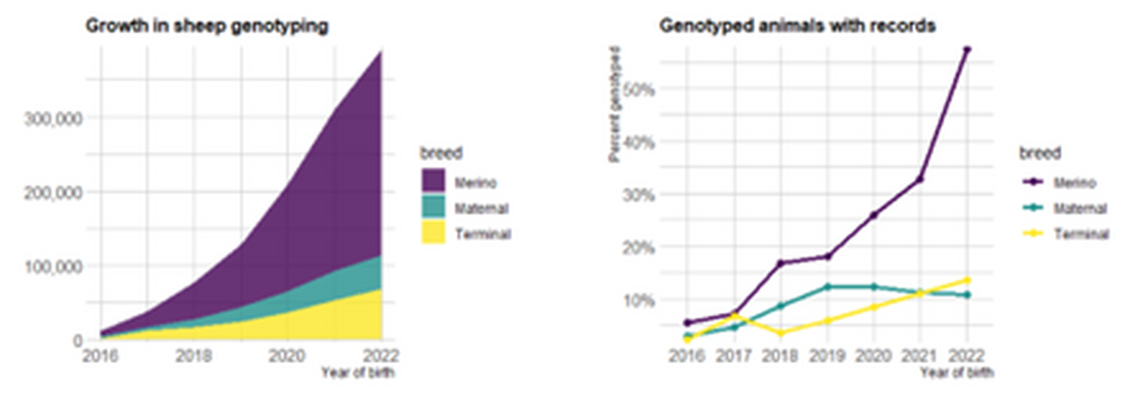Courtesy of Neogen
DNA based technologies have revolutionised livestock breeding in recent times, with DNA testing now routinely incorporated within dairy, sheep, and beef breeding programs around the world.
As with any new and emerging technology, Poll Dorset ram breeders should be considering whether DNA technology offers benefits to their enterprise, and if so, how it is best applied alongside other reproductive and genetic technologies within their breeding program.
Uses of DNA technology
DNA based technologies can be used for several different purposes within a Poll Dorset breeding program, including:
Parentage verification - A small percentage of errors will undoubtedly exist within parentage information that is collected via traditional means due to factors such as cross mothering and human transcription errors. DNA technology enables these errors to be identified and corrected, increasing the reliability of the parentage information that is available for animals within a flock.
Parentage assignment - In situations where parentage information is not available via traditional means, DNA technology can be used to assign the sire and dam of an animal. Use of DNA technology for parentage assignment offers several benefits including the use of syndicate joining groups, or a reduction in the on-farm labour associated with the traditional collection of parentage information.
Incorporation into LAMBPLAN ASBVs - When combined with pedigree and performance information, DNA, or genomic information, adds an additional source of information for the calculation of Australian Sheep Breeding Values (ASBVs), as published from the LAMBPLAN genetic evaluation, enabling the generation of ASBVs with additional accuracy, and ultimately enabling more accurate selection decisions to be made.
Genomic information provides the most additional accuracy to the calculation of ASBVs:
for animals that have incomplete, or a limited depth of pedigree
for traits that are hard to measure, or traits that cannot be measured prior to an animal entering the breeding flock.
for traits that have a low heritability.
in situations where collecting effective performance information is problematic, such as in small flocks, or when an animal has been removed from its contemporary group.
Developing a DNA testing strategy for your flock
Prior to investing in DNA based technologies, it is important that ram breeders develop a specific DNA testing strategy for their flock to ensure that they maximise the benefits that are obtained. When developing a DNA testing strategy, consideration should be given to such things as:
What DNA samples will be collected?
DNA samples can be collected in a number of different forms, including Tissue Sampling Units (TSUs), blood cards and semen straws. Of these, the recommended and most common form of DNA sample collection due its ease of collection and reliability during laboratory processing is TSUs.
Using a specific TSU applicator, TSUs involve collection of a simple tissue sample from the middle of the ear, making sure the TSU has been sealed correctly and then placing it into a TSU box or rack for mailing to the DNA laboratory.
When will DNA samples be collected?
DNA samples can be collected on animals of any age, and so should be undertaken at a time that best fits in with other normal, routine management practices, ensuring sufficient time is left for the availability of results.
DNA results are usually available within approximately four weeks from the time the samples arrive at the laboratory. An additional one to two weeks should also be factored in for the results to be processed through the LAMBPLAN analysis (data runs are conducted on the 1st and 15th of each month).
What animals will be tested?
Testing can be conducted as many or few animals as desired, depending on the objective.
Common testing strategies include a) testing an individual animal; b) strategically testing a group of animals of specific interest. For example, the top 30% of a cohort of ram lambs that have been identified as potential selection candidates; or c) testing an entire drop of lambs.
Which DNA product will be utilised?
The two most common DNA products offered by Neogen to Poll Dorset breeders are the ‘Parentage Test’, which links a lamb to its sire and/or dam, and the ‘Genomic Test’, which includes the parentage test, along with a high-density genotype for inclusion in the calculation of LAMBPLAN ASBVs.
The ‘Genomic Test’ offered by Neogen involves genotyping animals with a customised DNA chip that was developed specifically for use in the Australian sheep industry known as the GGP Ovine 50K. The chip was developed in collaboration with researchers at the University of New England, Agriculture Victoria and the Animal Genetics and Breeding Unit and specifically includes SNPs that explain the most genetic variation in the Australian sheep population. Research has shown that the inclusion of these SNPs on the chip increases accuracy by 7-10% by comparison to generic DNA chips.
Further Information
To further discuss the utilisation of DNA based technologies within your operation, contact Neogen Australasia’s Territory Manager team. Contact details for the Territory Manager in each region are available from the Neogen Australasia website (neogenaustralasia.com.au), or by contacting the Neogen customer service team on (07) 3736 2134 or naa@neogen.com.

Genomics is incorporated into the calculation of Australian Sheep Breeding Values (ASBVs) for an increasing number of animals each year.